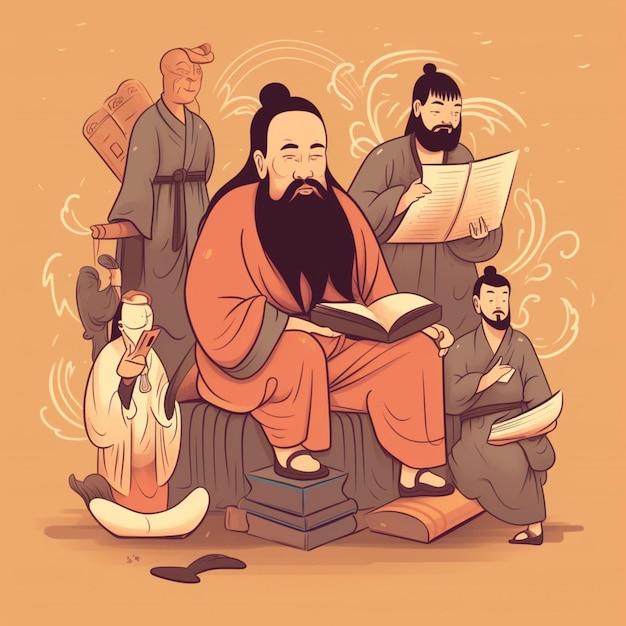Confucius, the renowned Chinese philosopher who lived during the Zhou Dynasty (551-479 BCE), left an indelible mark on the history of China and the world. His teachings, encompassed in the philosophy of Confucianism, continue to resonate even in the modern era. In this blog post, we will delve into the fundamental beliefs and teachings of Confucius and explore their enduring significance.
Confucius dedicated his life to constructing a moral framework that focused on harmonious relationships, ethical conduct, and social responsibility. Rooted in the pursuit of virtue, his teachings sought to cultivate an ideal society by emphasizing the importance of self-improvement and the cultivation of personal character. Confucius believed that by maintaining proper conduct and adhering to righteous principles, individuals could contribute to the well-being of their families, communities, and ultimately the entire nation.
Join us as we uncover the essence of Confucius’ teachings and delve into various aspects, such as his views on the behavior of kings, the influence of Confucianism on family dynamics, the impact on Chinese government, and the ultimate goal of this profound philosophy. By understanding Confucius’ wisdom, we can glean valuable insights that continue to shape our perspectives on morality, governance, and the pursuit of a harmonious society.

What did Confucius Teach and Believe
Confucius, the legendary Chinese philosopher, had a lot to say about life, ethics, and human nature. So, let’s dive into some of the key teachings and beliefs of this wise man!
The Golden Rule: Do unto others as you would have them do unto you
Confucius strongly emphasized the importance of treating others with kindness, respect, and empathy. He believed that the key to harmonious relationships lies in treating others the way we want to be treated ourselves. Simply put, if you want others to be good to you, start by being good to them.
The Virtue of Filial Piety: Love and respect thy parents
Confucius placed immense value on family and believed that maintaining strong familial bonds is crucial for a prosperous society. He emphasized the virtue of filial piety, which is the respect and love for one’s parents and ancestors. According to Confucius, honoring and caring for our parents is a fundamental duty that fosters harmony within the family and society as a whole.
The Doctrine of the Mean: Seek balance in all aspects of life
Confucius taught the importance of maintaining balance in every aspect of life. He believed in avoiding extremes and finding the middle ground, known as the “Doctrine of the Mean.” Whether it’s in our actions, emotions, or thoughts, Confucius advocated for moderation and harmony. After all, too much of a good thing can sometimes turn into a not-so-good thing!
Education: The key to self-improvement and societal progress
According to Confucius, education was the key to personal growth and societal progress. He believed that a well-rounded education, encompassing moral values, intellectual development, and practical skills, was essential for individuals to become enlightened and contribute positively to society. Confucius emphasized the transformative power of education in nurturing virtuous individuals and creating a harmonious, prosperous society.
The Importance of Rituals: Cultivating social order and harmony
Confucius emphasized the significance of rituals and proper conduct in establishing social order and harmony. He believed that adhering to ritualistic practices and etiquettes helped maintain a sense of collective identity, respect, and harmony within society. By following established social norms and rituals, people could create a sense of belonging and contribute to the greater good.
Human Nature: The potential for moral development
Confucius had an optimistic view of human nature. He believed that all individuals had the potential to cultivate moral virtue and improve themselves. While acknowledging that humans are inherently flawed, Confucius emphasized the importance of self-reflection, learning, and personal growth. By continuously striving to be better, individuals could contribute to the betterment of society as a whole.
Confucius, through his teachings and beliefs, emphasized the importance of kindness, respect, balance, education, rituals, and personal growth. His wisdom continues to resonate with people worldwide, reminding us of the values and virtues that can lead to a more harmonious and fulfilled life.
Remember, “The journey of a thousand miles begins with a single step” – a quote often attributed to Confucius himself!

FAQ: What Did Confucius Teach and Believe
How Did Confucius Believe a King Should Behave
Confucius had high standards for how a king should conduct themselves. According to his teachings, a king or ruler should act as a role model for their subjects. They should strive for benevolence, righteousness, and humility. By leading with virtue and setting a moral example, a king could inspire the people to behave ethically and promote harmony within society.
How Did Confucianism Impact Family
Family played a central role in Confucianism. Confucius emphasized the importance of filial piety, which means showing respect and loyalty to one’s parents and ancestors. He believed that cultivating strong family bonds and fulfilling familial responsibilities was the foundation for a well-ordered society. Confucianism encouraged individuals to prioritize the needs and well-being of their family members and maintain harmonious relationships within the household.
What Did Confucius Say About Government
Confucius believed that a righteous government should prioritize the well-being of its people. He emphasized the importance of wise and ethical leadership. According to Confucius, a government should be based on moral values such as integrity, justice, and compassion. He believed that when leaders govern with these principles in mind, their authority would be respected, and society would thrive.
What Was the Goal of Confucianism
The goal of Confucianism was to create a harmonious and well-ordered society. Confucius believed that this could be achieved through self-cultivation and the practice of moral virtues. He taught that individuals should strive for personal perfection by adhering to principles such as integrity, kindness, and righteousness. By embodying these values, individuals could contribute to the betterment of society and create a peaceful and prosperous community.
What Impact Did Confucianism Have on Chinese Government
Confucianism had a significant impact on Chinese government throughout history. It served as the guiding philosophy for many rulers and officials. Confucian teachings shaped the values and principles that governed the administration of the state. The emphasis on moral leadership and the importance of cultivating virtuous qualities influenced the selection and behavior of government officials. Confucianism played a crucial role in establishing a system of governance that aimed to prioritize the welfare and harmony of the people.
What Did Confucius Believe Was the Best Ruler
Confucius believed that the best ruler was one who possessed both moral integrity and knowledge. He emphasized the importance of leaders who not only have the wisdom to make informed decisions but also conduct themselves with virtue. According to Confucius, a competent ruler should be dedicated to the well-being of their people, rule with fairness and compassion, and lead by example. These qualities were seen as crucial for establishing a just and prosperous society.
What Did Confucius Teach and Believe
Confucius taught a wide range of principles and beliefs. Central to his teachings were the importance of moral values, filial piety, and social harmony. He believed in the significance of self-cultivation and the pursuit of knowledge. Confucius emphasized the role of education in shaping individuals and society. He taught that by cultivating one’s character and behaving ethically, people could contribute to the well-being of their families, communities, and the broader world.
What Does Confucianism Mean
Confucianism refers to the philosophy and teachings of Confucius. It encompasses a set of moral, ethical, and social principles that emphasize the importance of personal conduct, respect for hierarchy, and the well-being of society. Confucianism has had a profound influence on East Asian cultures, particularly in China, where it has shaped social relationships, governance, and educational systems.
Note: This FAQ section provides a concise overview of Confucius’ teachings and beliefs. For a more comprehensive understanding, exploring Confucian texts and further studies on the subject is recommended.
